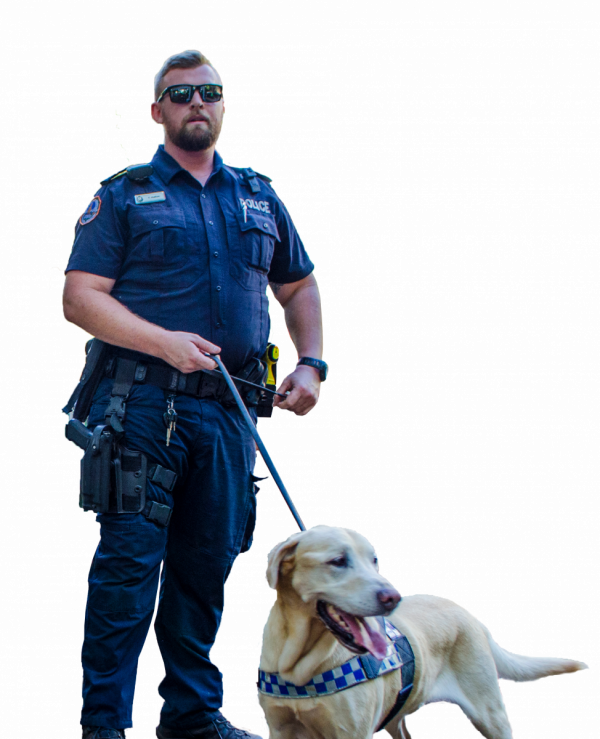From Kakadu to Uluru, policing in the Territory is an experience like no other – it demands many skills both physical and mental. Working as a NT police officer is much more than a job, it’s a rewarding career and lifestyle choice.

Constables are sworn police officers who enforce the laws of the Northern Territory (NT) and protect and serve the community. Vast and diverse, the NT offers unique challenges and experiences. NT police officers have the opportunity to be a part of the community and to really make a difference.
As a NT police officer you must be prepared for the unexpected. We are looking for mature and responsible people, who can think on their feet, who are resourceful and resilient, and who can solve problems while being compassionate.
Applicants who have an interest and a willingness to serve in remote areas are encouraged to apply!
- Read more!
Future opportunities are endless. Once you have gained skills as a uniformed frontline police officer, you are able to study and apply for specialised positions such as Criminal Investigations, Traffic and Major Crash, Intelligence, Crime Scene Examination, Water Police, Mounted Police and Dog Operations.
The NT Police recognises and values different characteristics of all applicants and the ‘ages and stages’ of their lives. We are committed to strengthening our capability through diversity and welcome applications from everyone. Women and Aboriginal and Torres Strait Islander people are encouraged to apply.
Training
The Recruit Constable training course incorporates 30 weeks paid, full-time training in Darwin at the Northern Territory Police, Fire and Emergency Services College at the Peter McAulay Centre, Berrimah.
The course is demanding and involves physical training and learning legislation, operational safety tactics, driver training, information systems and much more.
After graduation, trainees will be posted to varying locations throughout the Northern Territory as sworn Probationary Constables, filling operational policing roles with all the powers of a police officer.
- Read more!
The probation period extends to the second anniversary of commencement with the NT Police Force. Probationary Constables are required to provide on the job evidence in workplace practicums in order to satisfy probation requirements and be confirmed as a Constable in the NT Police Force.
At the successful completion of all requirements participants will be awarded the nationally accredited qualification Diploma of Policing (POL50124) by the NT Police, Fire and Emergency Services Registered Training Organisation (RTO Number 0384).
(Members of the NT Police Force may be required to serve in any geographical location where a police presence is required.)
Minimum requirements
Constables must:
- at the commencement of training be at least 18 years of age
- be Australian citizens or have permanent resident status, a New Zealand citizen or a New Zealand citizen residing in Australia under a Special Category Visa
- have either; a Senior Secondary Certificate (Year 12 or equivalent); or a completed trade certificate; or be able to demonstrate considerable employment experience and life skills
- have the ability to pass an assessment consisting of computer based cognitive and psychological testing
- be physically fit and healthy
- possess a current provisional or open drivers licence to drive a manual vehicle
- have general computing skills
- have the ability to swim 100m without interruption (forward facing stroke - breaststroke, freestyle or butterfly).
- possess qualification equivalent to Provide First Aid (also known as Apply First Aid/Senior First Aid)
- be of good character.
Selection process
If your initial application is approved the below processes will follow:
- Suitability background checks will be performed to identify any criminal/traffic offences.
- Cognitive assessment.
- Fitness assessment.
- Panel interview.
- Referee checks.
- Pre-employment medical.
- Probity checks.
(Please note: candidates who fail to meet the required standards may be excluded from submitting an application for a determined period and will be notified in writing).
If you have any questions, you can contact the NT Police Recruitment at ShapeYourFuture@pfes.nt.gov.au or call 1800 005 099.
Remuneration and allowances
Police Constables enjoy attractive remuneration which includes a number of allowances:
| Rank | Base rate | Inclusive of 23% consolidated allowance and 5% GPA |
|---|---|---|
| Recruit - first 4 months | $71,749 | Allowance not paid during training |
| Recruit - after 4 months to graduation | $76,053 | Allowance not paid during training |
| Constable 1 | $83,659 | $107,083 |
Consolidated allowance
Consolidated allowance is 23% of the officer’s annual salary. Payment of this allowance starts at the commencement of duties at their geographical location at the completion of training.
General policing allowance
Officers performing general duties will receive the general policing allowance of 5% of their annual salary.
Night shift allowance
Officers who work regular rostered shift work, will be paid an allowance of 15% of the officer’s base annual salary converted to an hourly rate and paid for each night shift actually worked.
The above allowances do not apply to Recruit Constables.
Accommodation
Depending on family composition, the NTPF provides all Police Constables and Aboriginal Community Police Officers (including Recruit Constables) with either barracks accommodation, free departmental accommodation or a housing allowance. If you or your partner are purchasing a property in the location in which you are stationed or you choose not to accept an offer of an approved dwelling, your entitlement will be to the housing allowance.
Housing allowance
The housing allowance is a taxable allowance that is currently $31,847.00 per annum.
The allowance is paid per fortnight to officers who choose to provide their own accommodation, either renting or buying. This allowance is subject to regular reviews in conjunction with any CPI increases and is also subject to PAYG tax.
Relocation expenses
Relocation assistance, up to $20,000, may be available, however, any such assistance will be in the form of reimbursement only, upon provision of satisfactory evidence of expenditure incurred.
Study assistance
Availability of study assistance on application for approved study.
Apply today!



